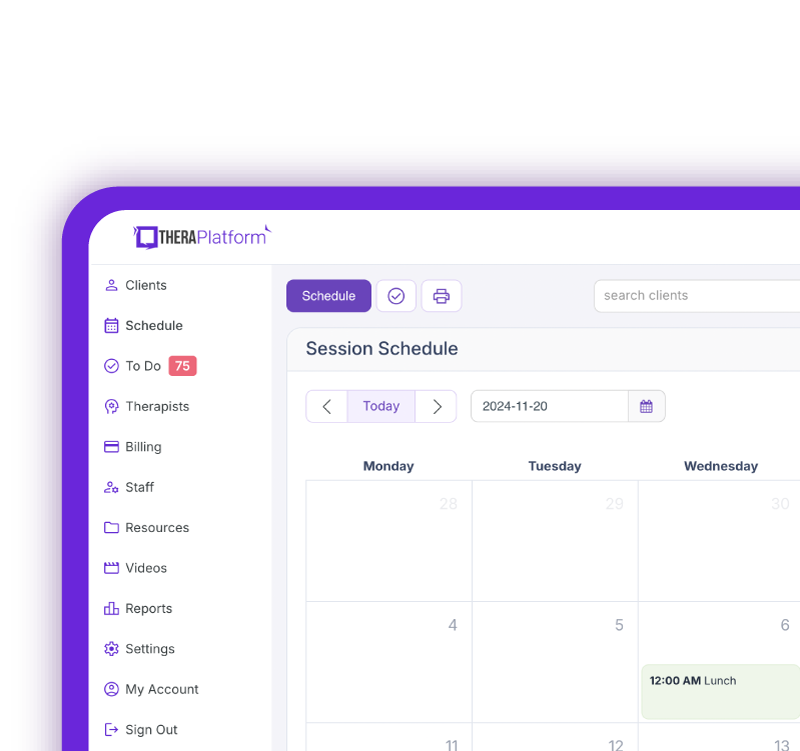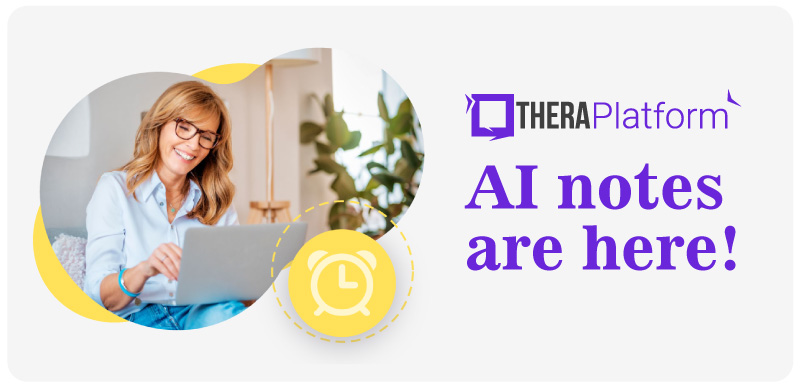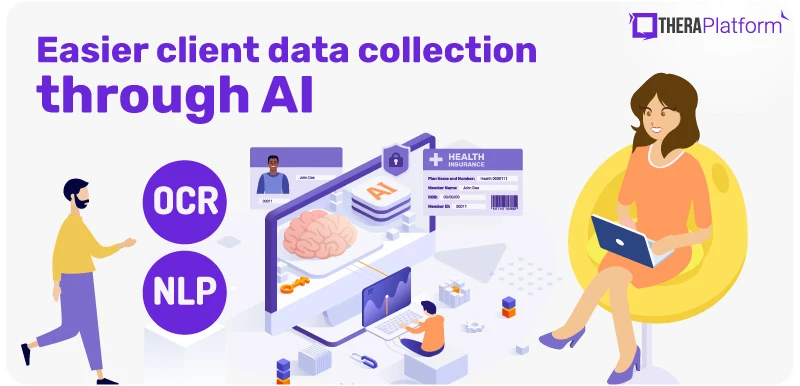AI and mental health

Artificial intelligence (AI) in mental health is profoundly reshaping the industry – not as a replacement for human therapists but as a powerful tool to enhance their work.
Summary
- AI supports, not replaces, therapists: AI is enhancing mental health care by streamlining tasks like documentation, scheduling, and clinical analysis, allowing therapists to focus more on human connection and personalized care. By leveraging an EHR like TheraPlatform for efficient documentation and claim submission, therapists can maintain accurate and secure records.
- AI boosts efficiency and insight: Tools like NLP for therapy notes, predictive analytics, and AI-driven CBT modules help therapists save time and gain deeper clinical insights to support better decision-making.
- Ethics and privacy are critical: Therapists must ensure AI tools are HIPAA-compliant, ethically deployed, and used with informed client consent, while actively guarding against bias in AI models.
- Staying informed is key: As AI evolves, therapists are encouraged to engage in ongoing education, attend conferences, and collaborate with tech developers to integrate AI responsibly and effectively into their practice.
Streamline your practice with One EHR
- Scheduling
- Flexible notes
- Template library
- Billing & payments
- Insurance claims
- Client portal
- Telehealth
- E-fax

From automating time-consuming administrative tasks to providing data-driven clinical insights, AI has the potential to make therapy more efficient, accessible, and precise.
However, responsibly integrating AI requires careful navigation of ethical dilemmas, strict adherence to privacy standards, and a clear understanding of its limitations. While AI can analyze data at unprecedented speeds, the heart of therapy remains deeply human—a space for empathy, connection, and nuanced understanding.
This article explores how therapists can leverage AI in mental health to streamline their practice while preserving the irreplaceable human element that defines effective mental health care.
Watch this video to discover 3 smart ways AI can speed up your note-taking
→ Start My Free Trial - Save Hours on Notes Starting Today
AI-powered tools for mental health therapists
Natural Language Processing (NLP) for Therapy Notes
One of the most immediate benefits of AI in therapy is its ability to handle documentation. Natural Language Processing (NLP) tools can transcribe sessions in real-time, allowing therapists to focus fully on their clients rather than scrambling to take notes.
Beyond transcription, these tools can analyze language patterns to track emotional trends, helping clinicians identify subtle shifts in a client's mental state over time.
For example, sentiment analysis might detect increasing hopelessness in a patient's word choices, signaling a need for intervention. AI can also summarize key insights from sessions, making it easier for therapists to review progress without sifting through pages of notes.
These tools save time and help therapists maintain more accurate and organized records.
AI-powered scheduling and administrative tasks
Administrative tasks take up valuable time that could be spent on patient care or continuing education and growth. AI can help therapists manage their workload more efficiently through:
- Automated appointment booking and reminders: AI-driven scheduling tools can handle client bookings, send appointment reminders, and even reschedule sessions based on availability.
- Billing and insurance assistance: AI can process insurance claims, verify patient eligibility, and reduce billing errors, making financial transactions smoother for both therapists and clients.
By automating these processes, AI allows therapists to focus more on their clients rather than paperwork. It is important that clients practice confidentiality when using these tools and that they are aware that AI tools are being used.
AI for clinical decision support
AI can also assist therapists in diagnosing and treating mental health conditions. Some key applications include:
- Predictive analytics for early intervention: AI algorithms can analyze data from therapy sessions, wearable devices, and patient histories to identify individuals at risk of developing severe mental health conditions.
- AI-assisted screening tools: AI-driven assessments can help therapists screen for conditions like depression, anxiety, PTSD, and ADHD with greater accuracy by analyzing linguistic patterns, facial expressions, and behavioral data.
These AI-powered insights can enhance a therapist's decision-making, but therapists should use professional judgment alongside these tools.
Practice Management + EHR + Telehealth
Manage more in less time in your practice with TheraPlatform

Using AI to enhance teletherapy and remote care
Teletherapy has become a crucial part of mental health care, especially since the COVID-19 pandemic. AI tools are making remote therapy more effective by providing additional insights into client well-being.
AI-driven video analysis for non-verbal cues
In face-to-face therapy, therapists rely on body language and facial expressions to assess a client's emotional state.
AI-powered video analysis tools can analyze microexpressions and vocal tones to detect subtle emotional shifts, which can help therapists:
- Identify stress, anxiety, or depression in clients
- Track emotional progress over multiple sessions.
- Enhance remote therapy by compensating for the lack of in-person interaction.
Again, it is essential to note that clients must consent to these tools, and therapists should exercise due diligence regarding confidentiality and accuracy. Microexpressions and body language are not one-size-fits-all for personality, culture, and many other reasons.
Personalized digital mental health programs
Some AI-driven digital mental health platforms can use NLP and behavioral insights to provide personalized client support between therapy sessions.
These chatbots can:
- Offer cognitive behavioral therapy (CBT) exercises
- Guide users through meditation and mindfulness techniques
- Provide immediate support for clients experiencing distress
While not replacing human therapy, these tools can supplement treatment and help clients practice therapeutic techniques outside sessions. Therapists interested in a full review of available apps for clients should read the study by Hague and Rubya.
AI-enhanced CBT modules
CBT is one of the most widely used therapeutic approaches, and AI in mental health makes it more interactive.
AI-driven CBT modules can:
- Adapt interventions based on client responses.
- Use data analytics to recommend personalized coping strategies.
- Provide therapists with insights into which techniques are most effective for individual clients.
These AI-powered tools can make CBT more engaging and effective while allowing therapists to track progress more efficiently.
AI in mental health research and personalized treatment
Big data analysis for mental health trends
By analyzing large datasets, AI can help identify emerging mental health trends, such as the impact of social media on anxiety or the prevalence of burnout among healthcare professionals.
These insights can:
- Guide public health policies
- Inform therapists about new treatment approaches
- Help mental health organizations allocate resources more effectively
Personalized treatment plans based on AI insights
AI can help therapists create highly personalized treatment plans by analyzing patient data, session notes, and treatment history and allows for:
- More precise recommendations for therapy techniques.
- Customized medication plans in collaboration with psychiatrists.
- Continuous adaptation of treatment based on patient progress.
AI-driven measurement-based care
Measurement-based care involves tracking patient progress over time using standardized metrics. AI can:
- Automate progress tracking through digital assessments
- Provide data-driven feedback to therapists
- Help adjust treatment strategies based on real-time patient data
By incorporating AI-driven measurement-based care, therapists can ensure that treatments are effective and tailored to individual client needs.
Free Resources for Therapists
Click below and help yourself to peer-created resources:

Ethical considerations and best practices
Privacy and HIPAA compliance in AI tools
AI tools must comply with privacy regulations, such as HIPAA in the U.S., to protect client data. Therapists should:
- Use AI tools that offer end-to-end encryption
- Ensure that AI-driven platforms do not store sensitive client information without consent.
- Regularly review privacy policies and data security measures.
The importance of human oversight with AI in mental health
While AI can assist therapists, it cannot replace human judgment.
Therapists must:
- Verify AI-generated insights before making clinical decisions
- Maintain direct client engagement to ensure a personalized approach
- Use AI as a supplement rather than a replacement for professional expertise
Addressing biases in AI models
AI models can reflect biases based on the data they are trained on.
To ensure fair and effective treatment, therapists should:
- Use AI tools developed with diverse and representative datasets
- Regularly evaluate AI-driven recommendations for potential bias
- Advocate for transparency in AI model development
Future of AI in mental health therapy
Upcoming advancements of AI in mental health
Looking ahead, AI in mental health will only expand. Emerging technologies include more sophisticated sentiment analysis tools that can parse complex emotional states, virtual AI therapists for initial intake sessions, and deeper integration with wearable devices to track physiological markers of mental health in real-time.
For therapists, staying informed is key. Attending workshops on AI in mental health, collaborating with technologists, and participating in pilot programs can help clinicians harness these tools effectively.
The goal isn't to let AI take over therapy but to use it in ways that amplify therapists' skills—freeing them to focus on the human connection that heals.
How therapists can stay informed and integrate AI responsibly
Therapists looking to incorporate AI into their practice must stay informed about emerging technologies while maintaining ethical and clinical standards. The field of AI in mental health is evolving rapidly, and keeping up requires proactive engagement with the latest research, tools, and best practices.
One of the best ways to stay current is by attending specialized conferences focusing on AI in mental health.
Events like the American Psychological Association's (APA) annual convention or the Mental Health Technology Conference often feature sessions on AI in mental health including applications in therapy, ethical considerations, and hands-on demonstrations of new tools.
These gatherings provide opportunities to hear directly from researchers developing AI solutions and network with other clinicians experimenting with these technologies in their practices.
Beyond conferences, participating in workshops and training programs can help therapists develop hands-on skills for using AI-powered tools effectively.
Organizations like the National Institute of Mental Health (NIMH) and private companies such as Woebot Health occasionally offer training sessions on integrating AI into clinical workflows. Workshops can cover topics like interpreting AI-generated insights, ensuring patient privacy, and avoiding over-reliance on automated recommendations.
Engaging in direct discussions with AI developers and researchers is another potential step. Many universities and tech companies have interdisciplinary teams working on AI in mental health, and therapists can contribute valuable real-world perspectives.
Providing feedback on prototype tools, participating in beta testing, or even collaborating on research projects can help shape AI development in ways that align with clinical needs.
Online forums, such as LinkedIn groups or professional associations like the Association for Behavioral and Cognitive Therapies (ABCT), can facilitate these conversations.
Finally, therapists should cultivate a mindset of critical evaluation when adopting AI tools and means asking key questions:
- Does this tool have peer-reviewed research supporting its effectiveness?
- How does it handle patient data privacy and HIPAA compliance?
- What are its limitations, and how can I mitigate potential biases?
By combining ongoing education, hands-on training, and active dialogue with the AI community, therapists can integrate these technologies responsibly—enhancing their practice without compromising the human-centered core of mental health care.
The balance between AI assistance and human-centered therapy
While AI offers efficiency and insights, therapy remains a deeply human process. The key is to strike a balance where AI supports therapists without replacing the personal connection essential to effective treatment.
AI has the potential to revolutionize mental health therapy by improving efficiency, enhancing client care, and offering new insights. However, ethical considerations, privacy concerns, and AI's limitations must be carefully managed. Therapists exploring AI tools while maintaining ethical standards and human oversight can enhance their practice and provide better client support.
Streamline your practice with One EHR
- Scheduling
- Flexible notes
- Template library
- Billing & payments
- Insurance claims
- Client portal
- Telehealth
- E-fax

Resources
Theraplatform is an all-in-oneEHR, practice management and teletherapy solution with AI-powered note taking features that allows you to focus more on patient care. With a30-day free trial, you have the opportunity to experience Theraplatform for yourself with no credit card required. Cancel anytime. They also support different industries including mental andbehavioral health therapists ingroup practices andsolo practices.
More resources
- Therapy resources and worksheets
- Therapy private practice courses
- Ultimate teletherapy ebook
- The Ultimate Insurance Billing Guide for Therapists
- The Ultimate Guide to Starting a Private Therapy Practice
- Mental health credentialing
- Insurance billing 101
- Practice management tools
- Behavioral Health tools
Free video classes
- Free on-demand insurance billing for therapist course
- Free mini video lessons to enhance your private practice
- 9 Admin tasks to automate in your private practice
References
American Psychological Association. (2024). Artificial intelligence in mental health care. Retrieved from https://www.apa.org/practice/artificial-intelligence-mental-health-care
Shatte, A. B. R., Hutchinson, D. M., & Teague, S. J. (2019). Machine learning in mental health: A scoping review of methods and applications. Psychological Medicine, 49(9), 1426–1448. https://pubmed.ncbi.nlm.nih.gov/30744717/
Haque MDR, Rubya S. An Overview of Chatbot-Based Mobile Mental Health Apps: Insights From App Description and User Reviews. JMIR Mhealth Uhealth. 2023 May 22;11:e44838. doi: 10.2196/44838. PMID: 37213181; PMCID: PMC10242473.
Luxton, D. D. (2016). An introduction to artificial intelligence in behavioral and mental health care. Academic Press. https://doi.org/10.1016/C2014-0-03871-5 https://www.sciencedirect.com/science/article/abs/pii/B9780124202481000015
National Institutes of Health. (2023). Artificial intelligence and machine learning in mental health services research. Retrieved from Artificial Intelligence at NIH | Data Science at NIH
Fiske, A., Henningsen, P., & Buyx, A. (2019). Your robot therapist will see you now: Ethical implications of embodied artificial intelligence in psychiatry, psychology, and psychotherapy. Journal of Medical Internet Research, 21(5), e13216. https://doi.org/10.2196/13216 https://www.jmir.org/2019/5/e13216/
American Medical Association. (2021). Augmented intelligence in health care. Retrieved from https://www.ama-assn.org/practice-management/digital/augmented-intelligence-medicine
Gooding, P. (2019). Mapping the rise of digital mental health technologies: Emerging issues for law and society. International Journal of Law and Psychiatry, 67, 101498. https://doi.org/10.1016/j.ijlp.2019.101498. https://www.sciencedirect.com/science/article/abs/pii/S0160252719300950



